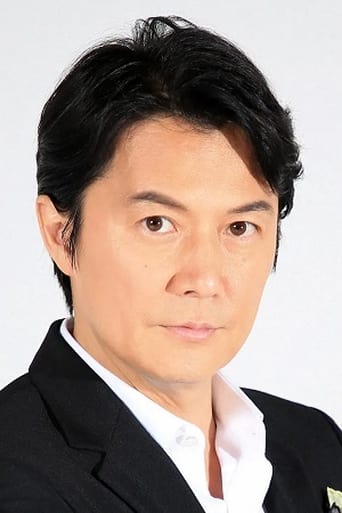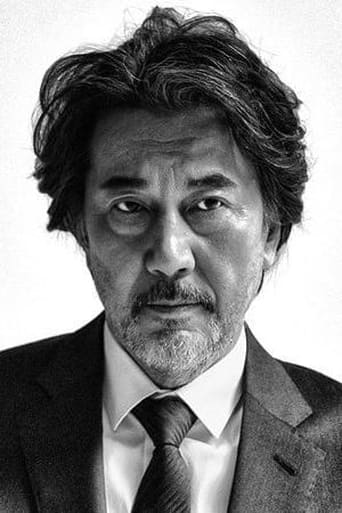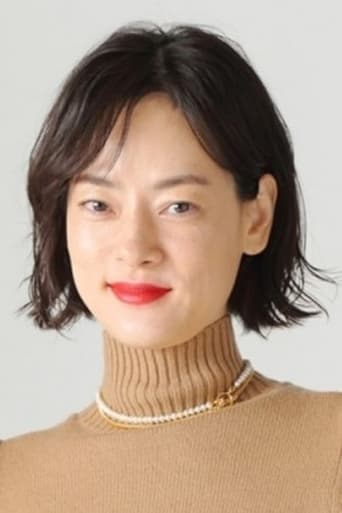Solemplex
To me, this movie is perfection.
SnoReptilePlenty
Memorable, crazy movie
Kien Navarro
Exactly the movie you think it is, but not the movie you want it to be.
Lachlan Coulson
This is a gorgeous movie made by a gorgeous spirit.
overdarklord
With "The Third Murder" Hirokazu Koreeda sidepaths from the more lighthearted thematics his more recent movies like "our little sister" or "after the storm" had and reenters the realm of profound dramas in which he previously worked with in movies like "Like father like son" and one of his ealier works "after life". While the light hearted stuff is enjoyable and it is not as much of a risky "hit and miss" as a movie like "afterlife" might be, I think his more deep and serious movies are definitly more impacting and memorable, thats why I think "The third murder" is definitly one of Koreedas finest works.In this crime thriller Koreeda explores heavily the ideas of truth, justice and especially motivation. Why do people say what they say? Can we really trust anyone? This movie was just so beautifully crafted with nearlly every scene you learn new things about character you thought you know already, just to find out how wrong you were, until you dont know what to believe anymore.The cinematography was pretty unique to his other movies I would say. He added some emotionally driven music shots that fitted quite well with the tone of the movie and made some character interactions that were already tense and interesting even better by presenting interesting camera shots.It was only fitting for Koreeda to give Masaharu Fukuyama the lead role given how well he did in "Like father like son" and he did a wonderful job again with this role. Also one of japans best actors "Koji Yakusho" did a perfect job, like most of the time and gave his role the exact nuance i was talking about previously, with being able to make yourself question your own judgement.Overall I can only recommend this movie. Hirokazu Koreeda is one of Japans best living directos and "the third murder" is one of his best movies and I am already looking forward of rewatching this movie.
BiiivAL
An experienced lawyer undertakes to defend a man accused of brutal murder. Everything is clear, like a day. The accused confessed and in the distant past had already passed through a similar case. However, intuition tells the lawyer that in this case everything is too smooth ...The new work of Hirokazu Koreda (After the Storm, Son in the Father, Miracle, After Life) is fascinating at first sight and does not let go. The producer, a dog who has eaten on meditative festival pictures, delays into the "mainstream" narrative easily and unobtrusively. The tape, although it has a number of contingent plot surprises, uses the standard detective canvas only as a background for deeper reflections. Each dialogue or phrase dropped carries a semantic question, the answer to which the viewer is trying to find together with the director.Despite the seemingly outward asceticism of the production, the tape does not look simple at all. Excellent camera work Mikiya Takimoto, with whom the director worked on the paintings "Son in the Father" and "Diary of Umimati, literally erases the boundaries of reality. And the music of Ludovico Einaudi ("1 + 1", "Strange crime") harmoniously complements the magic cinema.The lead actor's duet is incomparable. Conversations and transformations of the "lawyer" Masaharu Fukuyama (John Woo's "Hunting for the person", "Suspect X", "Son in the father", "Summer formula", "Sensation!") And the suspect Koji Yakusho ("The Emperor in August", " Tree of the Cicadas "," Thirst "," Harakiri "and" 13 murderers "Takashi Miike) are built and lived filigree. In the background, the charming Kotaro Yoshida (The Clinic of Love, The Woman Who Loves Lies, the Doric of Sentimental Tokyo) looked good as a colleague in a law firm.Summarizing: definitely, a heap of awards of "the Japanese Film Academy" the tape has deserved quite deservedly. Excellent directing, an indescribable mood and parable motives in a deceptively detective shell. Movies of great style.
Claudio Carvalho
The defense attorney Shigemori (Masaharu Fukuyama) is summoned to help his coworkers in a murder case. The prisoner Misumi (Kôji Yakusho) has confessed the murder of his former boss and factory owner that was burnt to ashes nearby a river to rob his wallet to pay debts in gambling. Misumi will face death penalty since thirty years ago he killed another man and was defended by Shigemori´s father. Shigemori´s purpose is to change the sentence from death penalty to life. Shigemori is not satisfied with the lack of evidences of the case and notes that Misumi changes his testimony in each interview. He decides to investigate deeper the case and questions the true motive for the murder. "Sandome no satsujin", a.k.a. "The Third Murder", is a tribunal and fatherhood drama with a screenplay with many twists. The storyline is based on a murder case with a confessing defendant and his new attorney seeking evidences to learn the truth. In common, there is the fatherhood: Shigemori is an absent father due to his dedication to his profession. Misumi is also an absent father since he has spent his last thirty years imprisoned. The victim was an abusive father and Misumi connects to his daughter as a second chance in life. In the end, was the murder to pay a debt with the Yakuza or a righteous justice act? My vote is seven.Title (Brazil): "O Terceiro Assassinato" ("The Third Murder")
fundaquayman
I've been a fan of Koreeda's work since Maborisi. His films have an incredible ability to bring a deeper layer of understanding to inherent contradictions to humanity without coming across as preachy or political - they make us ask ourselves why we exist, and what are the means to which we gauge our lives... through made-believe fantasies such as that in The Afterlife, the audience gets to see how memory is the actual currency to which our lives are measured by at the end of it all. And in Still Walking we see how the inability to let go of pain compels us to continue to remind those whom we want to blame for our painful past through rituals that are disguised as a celebration of life - all within the setting of an otherwise uneventful family gathering. Koreeda has the ability to turn the audience to focus not on the seemingly mundane or routine events taking place within the story, but the nuances to which characters in the story feel, react, deny, (and are confused by either each other's action, words, or their own memories of each other that either helped to move them forward toward a new path, or held them in prison so they're stuck in the past) - logic is rarely the path to which the audience follows in a Koreeda film to understand and appreciate the messages or questions we end up going away with, but almost always we leave the cinema asking ourselves, silently and quietly - are our own lives moving forward with or without meaning?In The Third Murder, we see the Koreeda trade-mark touches visually and in the score, all of which continue to show us how the world is essentially a place without emotions - in spite of all the vibrant city lights and colors, life can go on as if it's just a habit we cannot let go of. The mystery to the murderer - Misumi, first makes us think this is a story about a criminal who should have never been set free, and in the end the audience is left to question whether it is right for him to be penalized for a crime he may not have committed. Koreeda draws a parallel between the murderer (Misumi) and Shigemori, the lawyer protagonist, who begins as a character with more drive to win than he has time to integrate morals or ethics in his thinking. In the end of the movie, he is the only person in the story who suffers from having considered, yet failed while trying, to do the morally-right thing.To bring light to how legal system is flawed, or to highlight how the system and its lawyers often don't have ability to actually do the right thing when evidence is based only on speculation - none of that are new ideas or elements in the movies. This is as familiar as the line, "when legends become fact, we print the legend."If Koreeda's aim was to show us the flaws to the legal system, and how it forces upon us to bring closure to a case that is much more complex than the law can handle - the movie didn't work well to provoke or evoke - all of this has been done, and done better in the past by other movies. If Koreeda was trying to point out how much of a martyr the character Misumi is, and that of all the lawyers, victims, and conspirators, he's the only person in the story who had a clear purpose and meaning in life - to do the right thing by ending the wrong in spite of what the law allows - this was not convincing, and got lost within the overly complex layers of plot points and at best it hits the audience as a doubt or question on which character and what part of the story they should believe in. This movie didn't work well as political commentary, nor does it make for slice-of-life story about how people find meaning in life - perhaps things got lost in translation and I'm not seeing the Japanese cultural nuances as it's meant to be appreciated. but that's never been a problem with Koreeda films. Some critics have drawn comparisons and similarities to Kurosawa's Rashomon, I tend to not agree - Rashomon brings to light that truth can only be based on perception, and everyone can perceive differently and be affected by their selfish interests. The Third Murder only resembles Rashomon in how it show one character keep changing the alleged facts, when at the end of the movie it is quite clear to the audience two things: 1) Misumi enjoys being able to control the situation and the people involved, and 2) he knew how to manipulate the legal process so well that he changed the story and his role in the murder knowing how the law would interpret and adjust to deal with the case - all with the aim to end the case quickly by adding more weight to speculation that would lock him with the murder, when the real evidence was never considered (e.g. blood-stains on the girl's shoes).For a Koreeda film, this was a disappointment by comparison to his previous work (My Little Sister was also). If we are to consider the first murder to be the loan shark Misumi killed out of righteousness, the second being Sakie's father, then the 3rd murder's victim would then be Misumi himself - sorry, this isn't the kind of contrived Usual Suspects of a message I would expect from a master filmmaker/story-teller like Koreeda.








